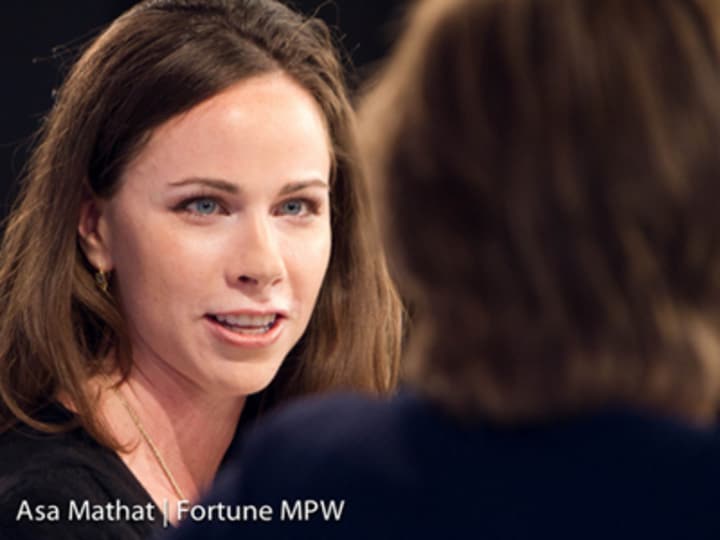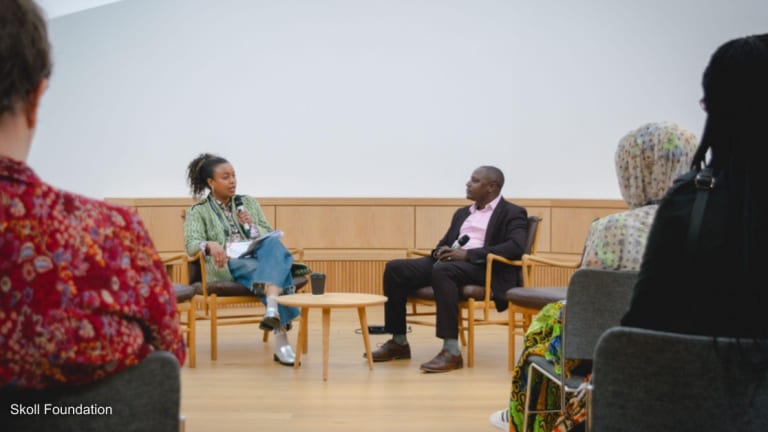
Barbara Bush, CEOand co-founder of Global Health Corps and daughter of former U.S. President George W. Bush, is building partnerships in six countries, including Burundi, Malawi, Rwanda, Uganda, Zambia and the U.S., to cultivate the next generation’s global health leaders.
Devex caught up with her at the 2013 Social Good Summit to hear more about how a network of young global health leaders can help to drive impact on the lagging Millennium Development Goals, set the health agenda of the future, and build a coalition of connected health advocates around the world.
The CEO of Global Health Corps envisions a post-2015 framework in which the youth will be more engaged in the crafting of global health development goals and become champions of that agenda to create a generation of committed and qualified leaders that can push for sustainable change.
Here are a few excerpts of our conversation with Barbara Bush:
What would you like to see on the post-2015 development agenda?
What I would love to see is younger voices used and engaged in the development agenda, primarily because it’s quite clear who will be running global health or development organizations in 2030 are people who are young right now. So I’d love to see younger voices engaged in the conversation and having more young people setting the goals that they will then carry out moving forward.
I hear a lot of youth voices who feel a lot of ownership over the goals that are being set, because they apply to them as well, and I do think our Global Health Corps fellows are eager and hungry to engage more broadly in bigger public discourse and dialogue, specifically around global health issues and many are on women’s health issues … I do think the UN process can be quite elusive to some people … but, for instance the Nike Foundation has a “Girl Declaration,” and I know they’ve gathered the voices of a million girls around the world to influence the MDGs. There’s a platform called “My World” that the U.N. Foundation has been using as well, and so I feel like there are various tools right now that are trying to gather those voices.
Do you see gaps in the global health workforce or particular leadership skills that the Global Health Corps is able to fill, or that you’re purposefully trying to develop?
Yes, absolutely. When we started Global Health Corps, we started it initially as a response to the fact that so many young people were interested in global health issues and they wanted to move that interest forward in a bigger way. We felt like that was something that could be taken advantage of, this sort of up-swell of interest and also of talent. What we are specifically trying to do is grab young leaders closer to the beginning of their careers, provide them an opportunity to learn every single day in the field by filling gaps within partner organizations, and then on top of that we coach them and mentor them really heavily throughout the year, so that they can learn as much in this year as possible, but also it allows it to be a launching point for them in global health.
I think the “fuzzier” skill sets that we see that are so critical to leadership in global health and in general are collaboration and humility and listening to the communities and asking why as much as possible, so that we are creating smart and effective solutions for the challenges that exist. A lot of our programming with our fellows is around developing these “softer” leadership qualities, with the expectation that they’ll use these qualities now but they’ll continue to … reach out to others to find what’s working, and to find non-traditional partners to help them be as effective as possible. We know that’s how we’ll make more of an impact in the field of global health.
This summit has focused a lot on technology for social good. Your organization is more about connecting people for social good. How do you think about issues of scale and maximizing impact when ultimately you’re talking about individual relationships?
Scale can look like a lot of different things … We’ve worked with 320 Global Health Corps fellows over the past four years, and we feel as if we’re really investing in their careers as change-makers. It’s not just about the one year that they do Global Health Corps. It’s about what they will continue to do after and the sphere of influence they will end up with. It’s our dream, and we designed our program towards this, that our Global Health Corps alums end up being the minister of health in the country they’re from, or being the minister of finance. If you think about scale in that way, then they’ll end up in positions where they can affect policy that will affect millions of peoples’ lives.
So when we think about impact and investment it’s very long term, it’s very future-looking. On top of that we’ve really seen how the power of our Global Health Corps network can effect change more quickly. We have these 320 fellows right now that are from 16 countries and they, every single day, reach out to each other and speak with each other. So, it’s kind of this collective action piece that now can get to scale more quickly … I think that there’s a lot of potential for impact in that network.
What kind of response have you noticed from the “traditional” implementer community — NGOs or contractors who are working on public health projects? How have they responded to your efforts to build a leadership pool that could ultimately be their leadership?
We’ve been so lucky to partner with existing, established players in the field of global health. We partner right now with nonprofits or government agencies — mainly ministries of health — who take our fellows on for a year. So they identify gaps that they have in the scopes of work that they would want two fellows to work on. Our fellows work within them every single day for a year, always in teams of two — one fellow from that country partnered with an international fellow. We’ve been pretty excited by the caliber of our partner organizations and the commitment that they bring to the health challenges that they’re working on, but also really excited that they see our fellows as critical and as vital. To some degree this is a pipeline of talent for them to be employing. We’re building this pool, and ideally organizations will see the value of our fellows and hire them, which is happening now. We have fellows that work in the Ministries of Health, and it’s great for us to go into meetings and have Global Health Corps alumnus in our meetings.
Your model focuses on partnership and building community for global health, but you’re also in the business of breaking down barriers of entry into the global health field for people who might not have thought of themselves as global health practitioners in the past. What lessons have you learned about how to broaden the definition of a global health problem to make it appeal to people who might have a different background?
Health is so related to poverty. It’s so related to education, to women’s issues. The field of global health is messy, just because root causes of poor health outcomes come from such a variety of different issues … Our partners are requesting very nontraditional skill sets for global health, and because of that we can open up the field to anyone … Ten of our fellows have been architects. They see themselves as change-makers in global health, but that doesn’t mean they have to be a doctor or a nurse. They can bring the skills that they already have to the table. By bringing these different ways of thinking there’s a new creativity … That’s made it fun for us to be targeting skill sets that someone wouldn’t think — someone that’s working on supply chain management in the private sector, they wouldn’t necessarily think that’s a global health person, obviously health care access is so critical and ensuring that drugs get to the patients that need them is critical, and obviously someone with a supply chain background would be able to do that really well.
We’ve heard a lot about mainstreaming gender in development. Do you take any proactive stance on making sure that the leaders you cultivate or the specific programs or partnerships you put them into have a gender-based framework or outlook on health?
We’ve had overwhelming interest in our applicant pool to work on women’s health issues. Unfortunately or fortunately there’s been a bigger focus on women’s health issues recently, because we were falling behind on the MDGs focused on women. We’ve directly seen how that bigger dialogue, the bigger public discourse, has led to … a huge number of applicants who want to work on women’s and girls’ health issues. That’s something that we can take advantage of and adapt pretty quickly to provide opportunities for placements focused on these issues. I wouldn’t say that we take a gendered approach. I think we are trying to be as supportive as possible of organizations that are focusing on women and girls just because we know how to prevent and treat so many issues that affect women and girls, and it seems like now is the time that we need to be doing more of that. Global Health Corps will open applications for the 2014-2015 class on November 6th. We’re excited to welcome more young leaders to the global health movement and people should look out for application information on our website!
Tune in to Devex to get updates on all the global development events happening in New York, from the Clinton Global Initiative to the Social Good Summit and the United Nations General Assembly.
Read more:




